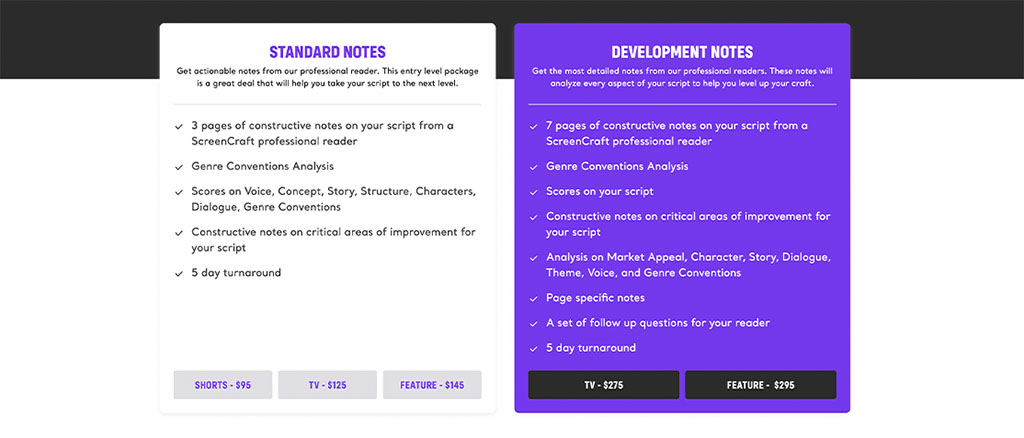Ridley Scott Has a Simple Secret for Pitching to Hollywood

I stumbled upon this excellent Hollywood Reporter interview with Ridley Scott (Alien, Blade Runner, Gladiator I and II, etc.). Some of the best advice for screenwriters and filmmakers comes from the most simple nuggets of insight, wisdom, and perspective.
Here, we’ll discuss Scott’s recent advice and insight into pitching and developing concepts, with my own elaboration based on my ongoing years as a pro screenwriter, as well as my time working in development at Sony Pictures as a script reader and story analyst.
Nail the Quick Pitch, Ridley Scott-Style
“I say, ‘Narrow it down to something very simple and brief—tell me the film in two sentences,’” says the renowned and iconic British director.
The truth is, pitching isn’t as hard as it needs to be. Screenwriters are usually the ones that make it harder on themselves.
The unspoken truth is that the logline (in this case, the one-to-two sentence core concept pitch that captures the essence of your story, the protagonist, the central conflict, and the genre) is really all that matters when it comes to screenwriters pitching their spec scripts.
Read More: The Simple Guide to Writing a Logline
If you write a long-winded query email detailing your love of writing and movies and go on and on about a contest you placed in or why your stories are perfect for X company, know that the only thing that really matters is that simple and brief two-sentence logline.
For query emails sent to managers (don’t query agents because they only come near a deal that is brewing), development executives, and producers/production companies, keep it short, sweet, and to the point. All they really care about at this point is the story you have. Hook them with that as quickly as possible, and then the rest will fall into place as far as them wanting to get to know you, your writing, and whether or not they want to consider your script or you for writing assignments.
Read More: Writing the Perfect Letter for Your Query Scripts
When it comes to pitching in person, what most screenwriters don’t realize is that most Hollywood meetings aren’t about pitching. Hollywood general meetings are all about getting to know you and your work to see if you’d be a good fit for collaboration. You may be asked more in-depth questions about your script, sure. In that case, you just need to know your story, intended themes, and characters inside and out.
Most actual pitch meetings are reserved for filmmakers needing to pitch their potential projects—or their takes on assignments—to studio executives, networks, streamers, and production companies.
When it comes to screenwriters, beyond attending pitch fests, those one to two-sentence loglines are really what sell your script beyond the actual read of them.

Ridley Scott on the set of 'Napoleon' (2023)
Give Your Story a Ticking Time Clock
Ridley Scott says, “You should light the idea up, and within that, you’ve got to have a fuse—a time bomb. When you just have [characters] doing something for something’s sake, that’s dangerous.”
Case in point, his latest producing effort, Alien: Romulus.
Based on his ongoing Alien franchise (he directed Alien, Prometheus, and Alien: Covenant), the producer's latest installment tells the story of a group of young scavengers trapped on a derelict space station that’s going to crash into a planet’s rings in 36 hours. Yeah, of course, there’s at least one Xenomorph alien involved. But the added element of the ticking time clock plot device gives added stakes to the story and characters.
This doesn’t only apply to science fiction and action stories. Ticking time clock plot devices can be effectively used in any genre, including drama. Trust me (and Scott). Adding such devices can make your script so much more desirable on their end—while also allowing you to tell the stories you want to tell.
Read More: Must-Read Analogy That Teaches “Raising the Stakes” in Screenplays

'Alien: Romulus' (2024)
Don’t Chase Trends—Figure Out What the Next “Ball” Is
“TV is a massive basket full of balls. Every now and again, something comes up like The Sopranos and Game of Thrones that influences everybody, who then rushes to that ball to copy it, and it’s already too late. That’s how I function as a director—what’s the next ball?”
Chasing trends is really only possible for Hollywood itself. I’m talking about major networks, studios, streamers, and production companies. They are usually in tune with what’s coming out and tracking well—and it’s easier for them to jump on any trend early. They have the money, they have the power to pull the trigger quickly, and they can hire the best writers, directors, and actors.
But even for them, it’s fairly difficult.
For novice or undiscovered screenwriters, chasing trends just isn’t worth the time. By the time you identify a trend, develop a concept, write the script, market the script, and get representation with the power and connections to get the script to the studios/networks/streamers/production companies, the trend is likely played out and the powers that be have likely developed their own attempts at cashing in on the trend.
Instead, try to be a trendsetter.
Easier said than done, right?
What you can do is give Hollywood what they want. What do they want? It’s fairly simple. They want what the audience usually wants—something familiar but new. Allow me to explain. As consumers of content, we’re fairly risk averse. We don’t like to take risks. When we go to the theater or look for something to watch on streaming platforms, we tend to go with things we know we’ll like. Why? Because it’s safe.
Screenwriters can offer something familiar but also something new—by taking the familiar and flipping it on its head.
Genre blending is a great way to accomplish this. It gives audiences something familiar, which draws them in but then gives them the thrill of experiencing a new twist on what they normally love.
If you want to avoid genre blending but still find a way to flip an otherwise familiar concept or genre on its head, all you need to do is subvert expectations. Certain concepts and genres have their general go-to elements—the familiar. To offer something new, play on those expectations and subvert them.
Read More: The Power of Genre-Blending Screenplays

'Thelma and Louise' (1991)
---
Sound advice and words of wisdom from one of cinema’s best—Ridley Scott. Sometimes, the best advice is the most simple. Thanks, Ridley.
Read More: The Best Pitching Advice From Screenwriting Twitter
Try our Genre Notes and get matched with a reader with relevant industry experience!

Ken Miyamoto has worked in the film industry for nearly two decades, most notably as a studio liaison for Sony Studios and then as a script reader and story analyst for Sony Pictures.
He has many studio meetings under his belt as a produced screenwriter, meeting with the likes of Sony, Dreamworks, Universal, Disney, Warner Brothers, as well as many production and management companies. He has had a previous development deal with Lionsgate, as well as multiple writing assignments, including the produced miniseries Blackout, starring Anne Heche, Sean Patrick Flanery, Billy Zane, James Brolin, Haylie Duff, Brian Bloom, Eric La Salle, and Bruce Boxleitner, the feature thriller Hunter’s Creed, and many Lifetime thrillers. Follow Ken on Twitter @KenMovies and Instagram @KenMovies76
Get Our Screenwriting Newsletter!
Get weekly writing inspiration delivered to your inbox - including industry news, popular articles, and more!




























